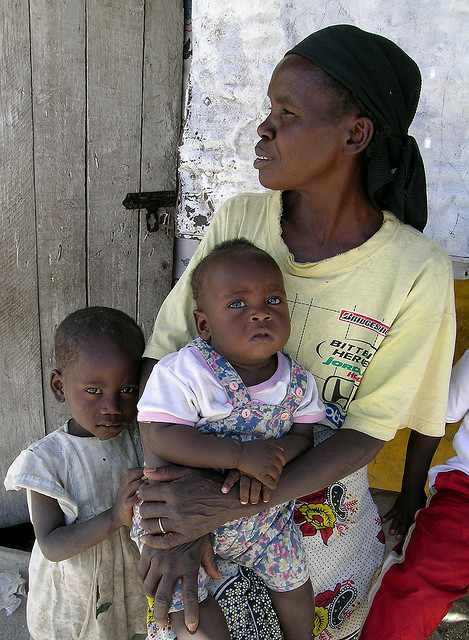
Family planning does not only improve the choices and lives of women and their families, it is crucial to developmental goals as well. Women and girls with access to family planning can decide whether to wait until they finish school to have a child. They can consciously decide how many children to have based on their income, which not only improves chances that they can provide for themselves but for their existing children as well. Together couples can decide to work and save enough money before they make the decision to have a child. Through the availability of options, women can better pursue education and opportunities that they choose and they and their children can be healthier and better supported financially thereby reducing possibility of hunger and poverty. The positive impacts family planning can have on lives and development are possible but require as much work as any other goals in developing countries.
At the 2012 London Summit on Family Planning, the UNFPA (United Nations Population Fund) came together with national governments, donors, the private sector, civil society and research and development community to plan the FP2020 program. The program’s objective is an increase in access to family planning methods to an additional 120 million women and girls by the year 2020. This increase focuses on the 69 poorest countries and over 70 governments are involved in the program. What is most hopeful about this program is the creative thinking behind methods to change, create, and improve access contraception. Those behind the program are keen to fund solutions that work in the regions where people need them the most. Doing so requires changes in systems and innovation.
Changing systems
In less developed parts of the world, the supply chain that delivers commodities (including contraceptives) can experience many problems. Products are not stocked consistently, reducing regular access, or there is difficulty in distribution due to poor road conditions or inadequate address systems. Whatever the reason, access to contraception may be inconsistent or difficult and addressing those systematic issues produces dramatic improvements. Women may try a contraceptive but be unable to continue using it because it is simply not available when they run out or need to refill a prescription. Market shaping methods are helpful in such cases.
As explained in the recent FP2020 report, market shaping is “the attempt to proactively shape the flow of commodities”. Market shaping cannot only improve commodity chains but it can make products more affordable, simplify regulations, and strengthen data that contributes to continuous efficiency and improvements. The USAID Deliver Project provides technical resources to improve supply chains and streamline procurement and delivery. In Sierra Leone, MSSL (Marie Stopes Sierra Leone) mobilized an effort to improve the waiver system that kept commodities at port for up to six months due to inefficiency and slow processing, resulting in penalties that increased prices for consumers. MSSL used a grant to lobby the government for a new policy, which was successfully won after months of negotiations. The policy ensured that duty waivers be approved on demand, lowering transport and distribution time as well as price. Women benefited from lower prices and from a smoother system that reduced delays in their access to contraception.
A 2011 survey discussed in the FP2020 report found that 84% of women in Senegal had encountered a “stock-out” in the past year. This means that when they needed their contraceptive product, it was not available or out of stock. In some cases, health care locations simply did not have a woman’s preferred method of contraception and only provided one or two contraceptive options at any given time. This particular stock-out problem prompted development of the Informed Push Model of distribution. Usually pharmacies and clinics track their inventory and report in their orders when they are low or out of a product. Under the new model, a delivery driver maintains a truck of supplies and makes stops at each location to “top off” the location’s supply and note the quantity available. Suppliers review the data to track demand and ensure that production is adequate to supply it.
Funding what works for Africa
 In addition to channeling funding into effective market shaping operations, the FP2020 initiative also embraces innovation and creativity to make positive enhancements in training, advocacy, education, and even contraceptive methods themselves. One contraceptive method receiving significant attention is the implant. Contraceptive implants are inserted into the arm where they release hormones on a timeline of three or five years. They are easily reversible if woman should decide that it is time to have a child, discreet for a woman whose husband or community does not approve of contraceptives, and convenient in areas where trips to the hospital or doctor are difficult and time consuming. The Implant Access Program (IAP) is a global program to increase access to implants through market shaping techniques such as price agreements in addition to local training and education programs.
In addition to channeling funding into effective market shaping operations, the FP2020 initiative also embraces innovation and creativity to make positive enhancements in training, advocacy, education, and even contraceptive methods themselves. One contraceptive method receiving significant attention is the implant. Contraceptive implants are inserted into the arm where they release hormones on a timeline of three or five years. They are easily reversible if woman should decide that it is time to have a child, discreet for a woman whose husband or community does not approve of contraceptives, and convenient in areas where trips to the hospital or doctor are difficult and time consuming. The Implant Access Program (IAP) is a global program to increase access to implants through market shaping techniques such as price agreements in addition to local training and education programs.
In some areas, health care workers with advanced training are scarce and funds to expand the particular workforce are low or nonexistent. This means that contraceptive methods that require insertion or injection could be difficult to acquire even if they are the best options for a particular woman’s situation. For example, many women in Kenya have to conceal the use of contraceptives from their husbands because their husbands do not believe women should use family planning. In these cases, women who want to make the choice of using contraception need an option that cannot be detected by their husband or even family. While implants are optimal for some because of their longevity, implants can also be felt under the skin. Injectable contraceptives are ideal in these situations.
Depo-Provera is one such example of an injectable contraceptive but as mentioned above, injecting sometimes requires skilled healthcare professionals to measure and administer the proper dose. If healthcare institutions lack adequate staff, many women may have to wait or even be unable to acquire injectable contraception. An innovative solution to address the multiple shortcomings of family planning services in some areas is a delivery system called Sayana Press that combines Depo-Provera with Uniject. Uniject is a one-use syringe that is often used for vaccines. It is packaged with a single dose of a vaccine, or injectable contraceptive, and is designed to be disposed safely and easily. Healthcare workers do not have to deal with the separation of vials and syringes, and lower-level workers only need two hours of training before they can properly and safely administer injections.
Implications
The FP2020 goals are certainly ambitious but they are a part of an important change to the approach of improving development. Rather than a top-down approach, which funnels money through an often slow moving or inefficiently structured government, this initiative is starting locally where women and girls know what they need and small changes in communities can make a tremendous difference. According to the Global Investment Framework for Women and Children’s Health, family planning is the intervention with the most potential to provide economic benefits not only to girls and women, but also to their entire communities.
Image credits
Mother and children - https://flic.kr/p/cp3v1
https://flic.kr/p/cqxYZG

